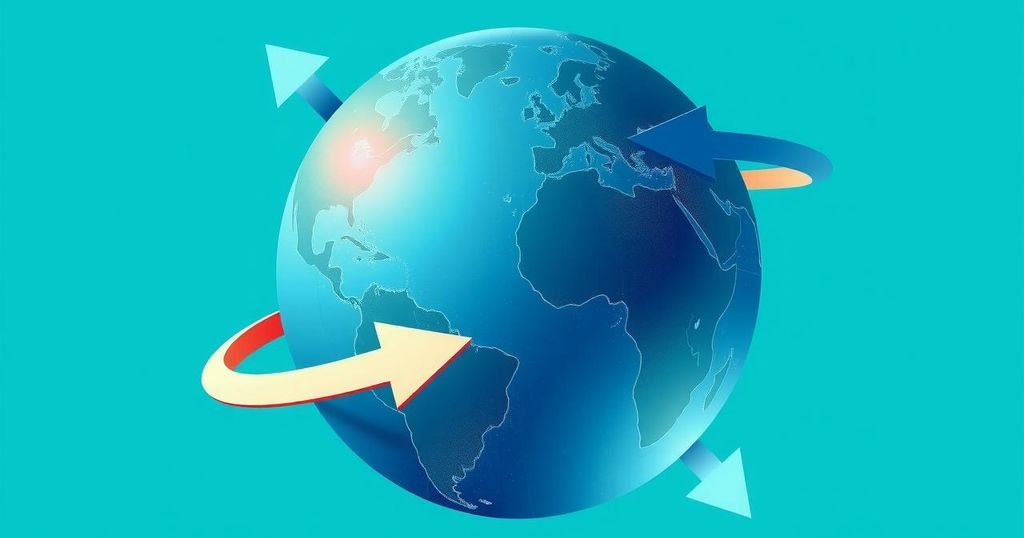The U.S. Retreat from Global Leadership and Its Consequences

The U.S. has drastically cut USAID programs, jeopardizing millions relying on humanitarian aid and destabilizing regions like the Horn of Africa. This withdrawal undermines U.S. global influence, increases risks of regional chaos, and creates opportunities for authoritarian regimes. As moral responsibilities are neglected, the U.S. faces inevitable repercussions from declining support for vulnerable populations.
The recent changes at the U.S. Agency for International Development (USAID) represent a drastic departure from the United States’ longstanding role as a humanitarian leader. This shift not only cuts significant funding but also jeopardizes global stability, particularly in vulnerable regions such as the Horn of Africa. The Trump administration has drastically reduced USAID’s active programs, terminating 5,200 out of 6,200 contracts, amounting to a $54 billion decrease in humanitarian support, threatening millions who rely on such assistance.
Since its establishment in 1961, USAID has played a critical role in promoting political stability and health worldwide, in part by leveraging aid to counteract rival influences. The agency has addressed various issues, from emergency relief to health care and nutrition. However, prioritization of bureaucratic efficiency over humanitarian needs raises concerns about the potential loss of U.S. influence and the exacerbation of crises.
The termination of aid, particularly in places like Somalia and Ethiopia, could lead to dire humanitarian consequences, with millions facing hunger and disease. As governments in these regions allocate scant resources to essential services, the withdrawal of aid poses a strategic threat to U.S. interests and allies. The ramifications are immediate, as access to health care and food assistance deteriorates.
Moreover, the retreat of U.S. aid and influence could have profound implications for regional security. Institutions like the African Union mission in Somalia, essential for combating groups such as Al-Shabaab, find themselves underfunded and vulnerable, potentially leading to increased chaos and instability in the region. This situation mirrors previous geopolitical vacuums and raises fears of rising extremist threats.
The geopolitical landscape is shifting—countries like Russia and China are seizing opportunities to extend their influence in the Horn of Africa and the Sahel. These nations offer conditioned assistance that lacks the emphasis on governance reforms seen in U.S. aid, enabling authoritarian regimes and undermining democratic ideals. This erosion of Western influence may embolden repressive governance and diminish prospects for stability.
The strategic pivot of U.S. foreign policy undermines the moral imperatives that have traditionally guided humanitarian efforts. A withdrawal of support for vulnerable populations is not an act of austerity but rather an abdication of responsibility and a complicity with rising authoritarianism. This retreat from the humanitarian landscape is a critical mistake that threatens not only those directly affected but the broader principles of democracy and human rights globally.
The question remains whether the U.S. can effectively respond to the inevitable repercussions of this withdrawal. The fallout may bring about humanitarian crises that do not respect borders, resulting in repercussions for global security and public health. The historical lessons suggest abandoning humanitarian commitments can lead to instability that returns to haunt nations, creating a cycle of crisis that demands far greater resources to resolve.
The recent cuts to USAID programs represent a significant shift away from the United States’ role in global leadership and humanitarian support. This strategic retreat not only risks exacerbating humanitarian crises in fragile regions but also may lead to increased instability and the rise of authoritarian regimes. As the geopolitical landscape shifts toward countries with less regard for human rights, the repercussions of this policy will likely affect global security and health. Therefore, it is crucial for the U.S. to reassess its actions and reaffirm its commitment to humanitarian ideals to prevent the potential consequences of this withdrawal.
Original Source: www.ethiopia-insight.com








